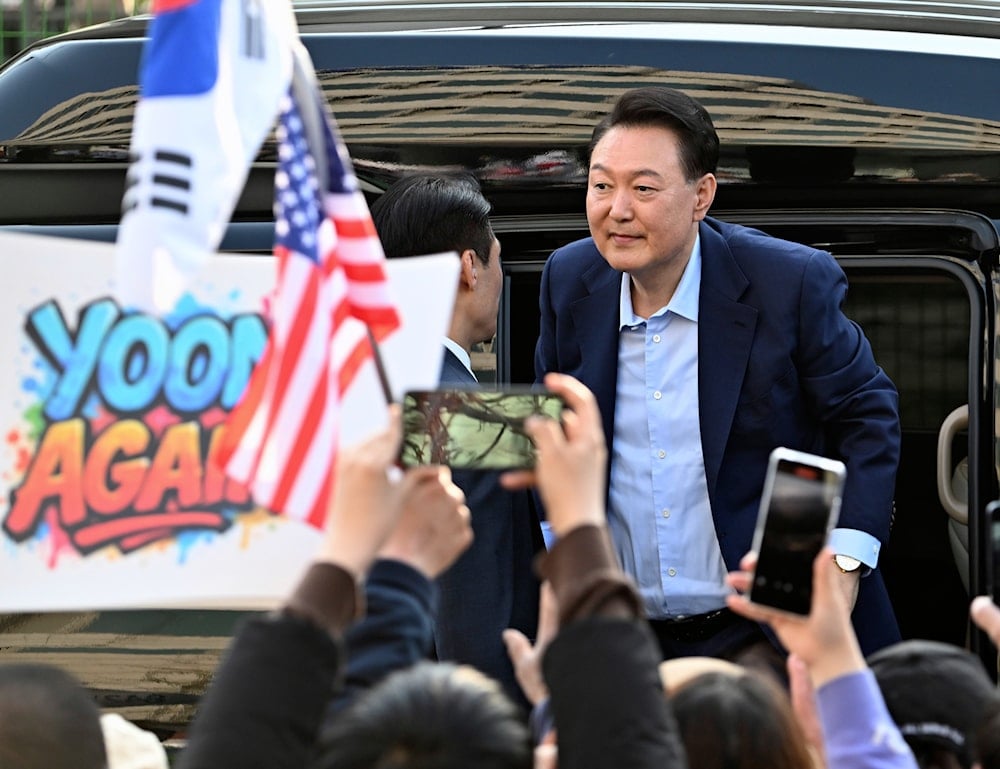South Korea's ex-president Yoon faces insurrection charges
If found guilty, the 64-year-old could be sentenced to life in prison or potentially face the death penalty.
-
 South Korea's ousted president, Yoon Suk Yeol, leaves his official residence in Seoul, South Korea, on April 11, 2025. (AP)
South Korea's ousted president, Yoon Suk Yeol, leaves his official residence in Seoul, South Korea, on April 11, 2025. (AP)
Former South Korean President Yoon Suk Yeol is set to face trial on Monday for insurrection, following his brief and controversial attempt to impose martial law late last year—a move that triggered widespread political upheaval in the country.
On December 3, Yoon declared a state of military rule, ordering a halt to political activity and introducing media censorship. However, the decree was swiftly overturned within six hours by opposition lawmakers in the National Assembly.
The failed action led to Yoon’s swift impeachment by parliament, and on April 4, the Constitutional Court officially removed him from office, stripping him of all presidential powers.
Despite his ousting, Yoon now faces serious criminal charges, with his insurrection trial set to begin Monday. During a preliminary hearing in February, his legal team challenged the legality of his detention. The court agreed, and Yoon was released after spending 52 days in custody. He had initially resisted arrest, making him the first sitting president in South Korean history to be detained while in office.
If found guilty, the 64-year-old could be sentenced to life in prison or potentially face the death penalty.
Yoon left the presidential residence on Friday and returned to his private home in Seoul, where he was seen greeting supporters. In a statement, he said: “Now, I return to being an ordinary citizen of the Republic of Korea, and I will seek a new path in service of our country and our people.”
South Korea calls snap election after Yoon ousted
South Korea will hold a presidential election on June 3 following the dramatic impeachment and removal of President Yoon Suk Yeol over his declaration of martial law, the country’s acting leader announced on Tuesday.
Prime Minister Han Duck-soo, who is serving as acting president, said the government "is to set June 3 as the date for South Korea’s 21st presidential election," noting that the day will be designated a temporary public holiday to ensure voter participation.
Yoon was stripped of office by the constitutional court for breaching his duties by issuing a martial law decree on December 3 and deploying military forces in an attempt to block proceedings in parliament.
Under South Korean law, a presidential election must be held within 60 days if the office becomes vacant.
The wider context
The political crisis erupted when Yoon’s martial law order stunned the nation, leading to his swift impeachment by lawmakers. Prime Minister Han was also impeached, though the constitutional court later reinstated him. He will remain in the role of acting president until voters elect a new head of state.
The power vacuum has cast a shadow over Seoul’s response to escalating economic pressures, including heightened US tariffs and a regional slowdown, amid tense dealings with US President Donald Trump’s administration.
Lee Jae-myung, the populist liberal leader of the Democratic Party who narrowly lost to Yoon in 2022, is currently the front-runner, though he remains entangled in several legal battles, including charges of election law violations and bribery.
The conservative People Power Party, reeling from Yoon’s downfall, now faces a wide-open race. Labour minister Kim Moon-soo declared his candidacy on Tuesday, emerging as the party’s most prominent contender.
It is worth noting that a Gallup Korea poll published on 4 April showed 34% of respondents favouring Lee for the presidency. Kim Moon-soo followed with 9%, ahead of former party leader Han Dong-hoon at 5%, Daegu mayor Hong Joon-pyo at 4%, and Seoul mayor Oh Se-hoon at 2%.
Read more: South Korean president indicted as 'ringleader of an insurrection'

 4 Min Read
4 Min Read










